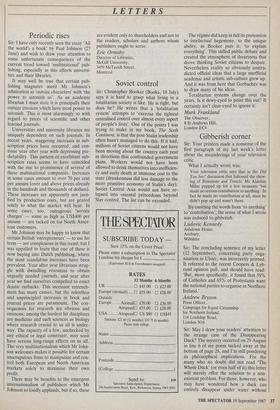LETTERS Periodic rises
Sir: I have only recently seen the essay 'All the world's a book' by Paul Johnson (27 June) and wish to draw your attention to some unfortunate consequences of the current trend toward 'multinational' pub- lishing, especially as this affects universi- ties and their libraries.
It may well be true that certain pub- lishing magnates merit Mr Johnson's admiration as 'outsize characters' with 'the power to astonish us'. As an academic librarian I must state it is principally their outsize invoices which have most power to astonish. This is most alarmingly so with regard to prices of scientific and other learned journals.
Universities and university libraries are uniquely dependent on such journals. In recent years, staggering increases in sub- scription prices have occurred, and con- tinue year after year with depressing pre- dictability. This pattern of exorbitant sub- scription rates seems to have coincided with the rise to prominence of several of these multinational companies. Increases in some cases amount to over 70 per cent per annum (over and above prices already in the hundreds and thousands of dollars). These increases are apparently not justi- fied by production costs, but are geared solely to what the market will bear. In some cases, too, outrageous 'service charges' — some as high as US$400 per annum — are tacked on for North Amer- ican customers.
Mr Johnson may be happy to know that certain British 'entrepreneurs' — to use his term — are conspicuous in this trend; but I was appalled to learn that one of these is now buying into Dutch publishing, where the most scandalous increases have been prevalent. Year after year librarians strug- gle with dwindling resources to obtain urgently needed journals, and year after year we find ourselves compelled to enact drastic cutbacks. This incessant retrench- ment has many causes, but the relentless and unprincipled increases in book and journal prices are paramount. The con- sequences for research are obvious and ominous; among the hardest hit disciplines are medicine and such sciences as biology where research crucial to us all is under- way. The rapacity of a few; unchecked by any ethical or legal constraint, may soon have serious long-range effects on us all. The very multinationalism which Mr John- son welcomes makes it possible for certain unscrupulous firms to manipulate and con- trol both European and North American markets solely to maximise their own profit.
There may be benefits to the emergent internationalism of publishers which Mr Johnson so loudly applauds, but if so, these are evident only to shareholders and not to the readers, scholars and authors whom publishers ought to serve.
Eric Ormsby
Director of Libraries, McGill University, 3459 McTavish Street, Montreal


































































 Previous page
Previous page